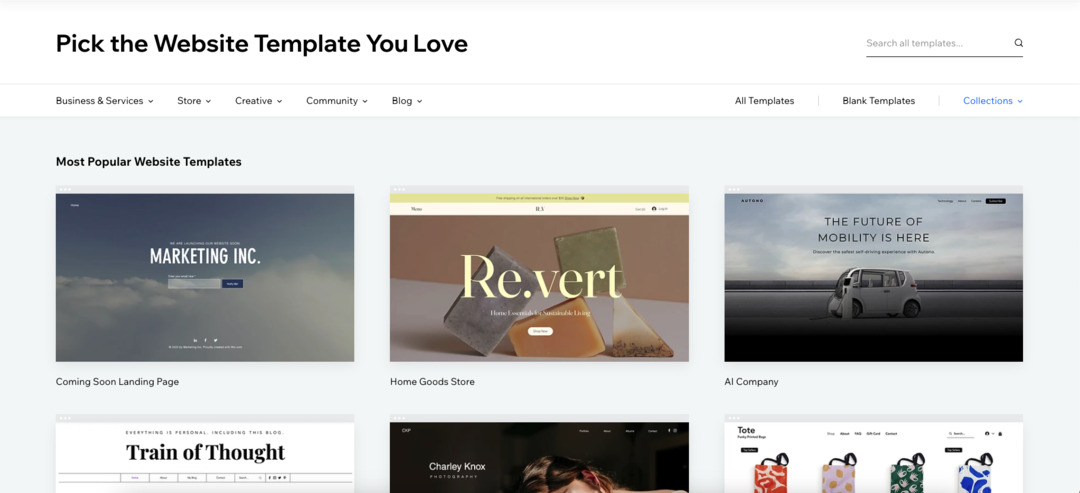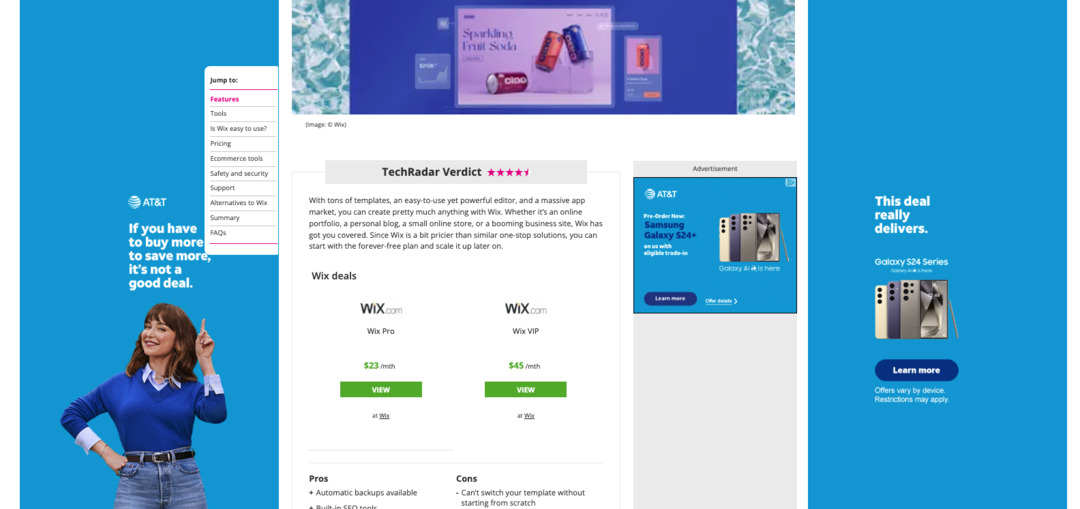How we test website builders at TechRadar
Here is how our experts test website builders to determine which is best

The best website builder platforms make it ridiculously easy to build and launch websites. They offer an all-in-one platform where you get everything you need including hosting, templates, and AI-powered tools to get your website online, all without having to write a single line of code.
With some predicting the website builder market to be worth close to $2bn, it is little surprise that there is a lot of competition out there, with every player claiming to be the best. So, separating the winners from the also-rans can be a challenge.
At TechRadar, it is our goal to offer quality, impartial advice to help you pick the best website building platform to meet your needs. When reviewing website builders we use a host of tests, checks, and analyses to identify the best website builder in each class.
This is how we do it.
Our testing process: Overview
Each time we review a website builder we undertake a thorough research and testing process. This is done with the audience in mind. For example, when creating a guide to the best website builders for agencies, we would focus and test different aspects than if we were creating a guide to the best small business website builders.
Here is a quick overview of what we do:
Data collection
We take an in-depth look at the provider’s website, support pages, and small print to understand what it claims to offer and how the service works. This gives an idea of the tools and features on offer, as well as the audiences that specific website builder targets.
Real-world testing
Next, we get hands-on with the website builder and use the service to build sample sites of various types, assessing how they perform on various metrics and in various areas such as speed, SEO, ease of use, and more.
Sign up to the TechRadar Pro newsletter to get all the top news, opinion, features and guidance your business needs to succeed!
We also compare our findings to the marketing materials to make an assessment on how accurately the brand represents its product.
Market research
Then we use our extensive market knowledge, along with additional research to assess how a website builder matches up to the competition, whether it’s very strong in one area or missing some crucial feature in another.
Customer reviews
We take account of customer sentiment and ratings on top review sites, social media, and, where we can, the website builder’s own forum or site.
Final scores
We convert the data we’ve gathered into ratings for every aspect of the service, then we combine these into a single overall score which best represents the quality of that website builder.
Write the review
Finally, we write up the results of our tests into a full review. We give you both an overall score of the website builder and detailed insight into which areas it performs well/poorly in. Our aim is to make it quick and easy for you to decide whether that website builder is the right one for you.
Website builders: What we assess
Bellow you find each area we assess when testing a website builder. This approach ensures a comprehensive testing process that is replicated across all platforms.
Ease of use
A website builder can have the lengthiest list of the most incredible features in the web design world, but that won’t help anyone if they’re difficult to understand, use, or even find. That’s why evaluating ease of use is one of our most important review tasks.
This all starts from the very first login. A good website builder clearly explains what you need to do first, and ideally helps you do it, leaving you confident and ready to start building right away.
The editor is all about balance. It’s great to have lots of features, but you mustn’t be overwhelmed by the clutter, or be left struggling to find what you need. Ideally, we’re looking for all the most common site-building features to be accessible with just a click or two, while the advanced features are tucked out of the way (though still quickly available when you need them.)
Even the smallest detail can make a huge difference. Does a toolbar use icons you can actually recognise for key features, for instance? If you look at a menu, do the various options clearly and accurately describe what they’re doing? Usability depends on many different factors, and we check them all.
For our final verdict, we also take into account the target audience for a website builder. What’s easy to use for a first-time user building a small personal site, might be very different to what you need if you’re an old hand building an international web store. We take the time to evaluate ease of use for different audiences, and highlight which users the website builder serves best, and where it needs more work.
Website features
We check every website builder to make sure it has the core features to present all types of content: maps, slideshows, image galleries, video players, social media feeds, and more.
We evaluate more advanced features based on a number of factors. If a website builder says it supports ecommerce, for instance, we’ll check whether there’s a limit on the number of items you can sell, if it supports digital and physical products, what payment, tax, and shipping support you get, transaction fees, and much more.
If a website builder can be extended with third-party apps, we look closely to see what’s available. We rank builders based on the number of apps on offer, the range of tasks they cover, the price, and how they’re rated by other users.
As Artificial Intelligence (AI) becomes more entwined in the website building process, we also take time to assess the AI tools available. Not only do we check what areas they cover, but we also check the quality of the outcome.
Website support and management features are important, too. We give extra points to website builders which offer analytics to help understand your audience, marketing tools to build traffic, backup and restore options, and security tools to detect, and remove malware.
Pricing and value for money

Website builders vary hugely in their prices, but we consider multiple factors to help you identify the best possible deals.
We consider free plans, trial periods, and money-back guarantees. These offer an intelligent way to overcome any uncertainty about picking the right website builder for your needs.
We also consider subscription lengths and associated discounts.
But it isn’t just about low prices. We also look at the features available in each plan to ensure it offers all the core essentials, and find out whether you’re getting any valuable extras.
Our ultimate goal is to help you understand how much value you are getting for what you spend. If the price is higher than average, what do you get beyond the norm? If it's unbelievably low, what might you be sacrificing?
We also pay particular attention to hidden costs. Does a provider offer a ‘free domain’, but then charge you $25 extra a year for renewals, say? Maybe the plan looks cheap, but essential features, like backups, cost extra? We factor in these unexpected charges to make sure our recommended providers offer genuine value for money.
Customer support
No matter how experienced you are, everyone needs help sometimes, and we test every website builder’s support system to find out just how helpful it really is.
How can you get in touch with a provider, for instance? We like to see ticket support, as if you have a long-term issue, the agent can see your history without you having to explain it again. But it’s also good to have live chat and phone support available when you’ve a quick one-off question.
We test these support methods to see just how each service performs. Does phone support force you through a lengthy menu system before you can talk to anyone? How long does it take to get a response on live chat? Are the agents able to handle complex problems and questions, or does it feel like they’re reading a script?
The best support isn’t just about solving one-off problems. We also explore every website builder’s web tutorials and knowledgebase, to make sure that you’ve the help you need to walk you through more complex tasks and get the very most out of the service.
Design features

Most of the top website builders now offer two different design options: templates and AI builder. We test both during our testing process.
Templates
Templates are pre-built designs which you can use as a starting point for your own website. They can be one of the most important factors in your choice of website builder, especially if you’re a web design beginner, or just want to produce a simple site as quickly and easily as possible.
When evaluating website builders, we look at the number of templates available, the range of industries they cover (how many templates are there for hotels, restaurants, photography sites?), their design and visual appeal, and whether they look just as good on both mobile and desktop displays.
But it’s not just about the visuals. We also build default sites with multiple templates and look at how they work. Do templates use lots of scripts, slowing them down? Are they properly optimized for SEO out of the box? Your website must look stylish and professional, but we want to be sure that it performs well, too.
AI builders
AI website builders create a bespoke template based on the prompts you give the AI interface. Typically these work either by selecting from multi choice questions or by describing exactly what you want to the AI via text. The AI then takes the info you provide and uses it to create a website template, complete with text and images, that fits your requirements.
When testing AI website builders, we start by seeing how easy it is to use. How does it want us to interact? How much guidance does it give us?
We then assess the output. How good does it look? How well does it function? How close is it to what we asked for? How much editing will it need to make it fit for purpose?
Hosting
Despite the name, website builders aren’t just about creating a site. Most also come with web hosting, and we take a close look at what’s on offer to make sure it suits your needs.
A site should have plenty of storage available, for instance, especially if you plan to host large image galleries, lots of downloads, or other space-hungry content.
We consider any bandwidth allowance, or the data your site is able to use each month. If your site has a lot of visitors, then it’s likely you’ll need a plan with more bandwidth.
Speed is important for any website, both in terms of user experience and search engine optimization. We take the time to build sample websites on the service and put them through multiple speed tests to get a feel for how well they perform.
How we decide a final score

Data collected, tests completed, and reports written up, we assess each provider on the metrics we’ve discussed above, and convert the results into a score out of five which is included at the top of our reviews.
But that’s not the end of the story. Website builders are constantly enhancing their existing features and adding new tools, so we regularly update our reviews, analyse any changes and additions, and, if appropriate, update the scores.
While the full review score is important for our overall rankings and best website builder guides, it may not tell the full picture. It’s possible for a website builder to rate 5 for ecommerce, say, but 3 for value. The final score points you in the right direction, but we recommend you read the full review to see if a website builder is right for you.
How we review website builders: Summary
We understand that our testing process is central to offering high quality, actionable advice. After all, if we don’t take the time to properly test each website builder, we can’t offer honest advice on which we believe are the best.
Our ultimate goal is to offer you everything you need to make an informed decision on the best website builder for your individual circumstances and needs.
The process we have outlined above is applied to each website builder we review. In turn, this extensive testing and research helps inform our buying guides where we list the best website builders based on specific criteria and needs.

Owain has been building websites and online stores for his own and his client's businesses for over 8 years. Having taken on a role at TechRadar Pro in 2023, he now leads on all website builder and CRM content, spending his days researching, testing, and reviewing some of the best website building and CRM platforms on the market. He also has a passion for helping people get a great deal on website builders, delivering the best coupon and promo codes on the market. With an extensive background in business, Owain holds a BA(Hons) in Business and Marketing and has written for several leading publications including MarketingProfs, Website Builder Expert, Digital Doughnut, and NealSchaffer.com.
- Mike WilliamsLead security reviewer
You must confirm your public display name before commenting
Please logout and then login again, you will then be prompted to enter your display name.